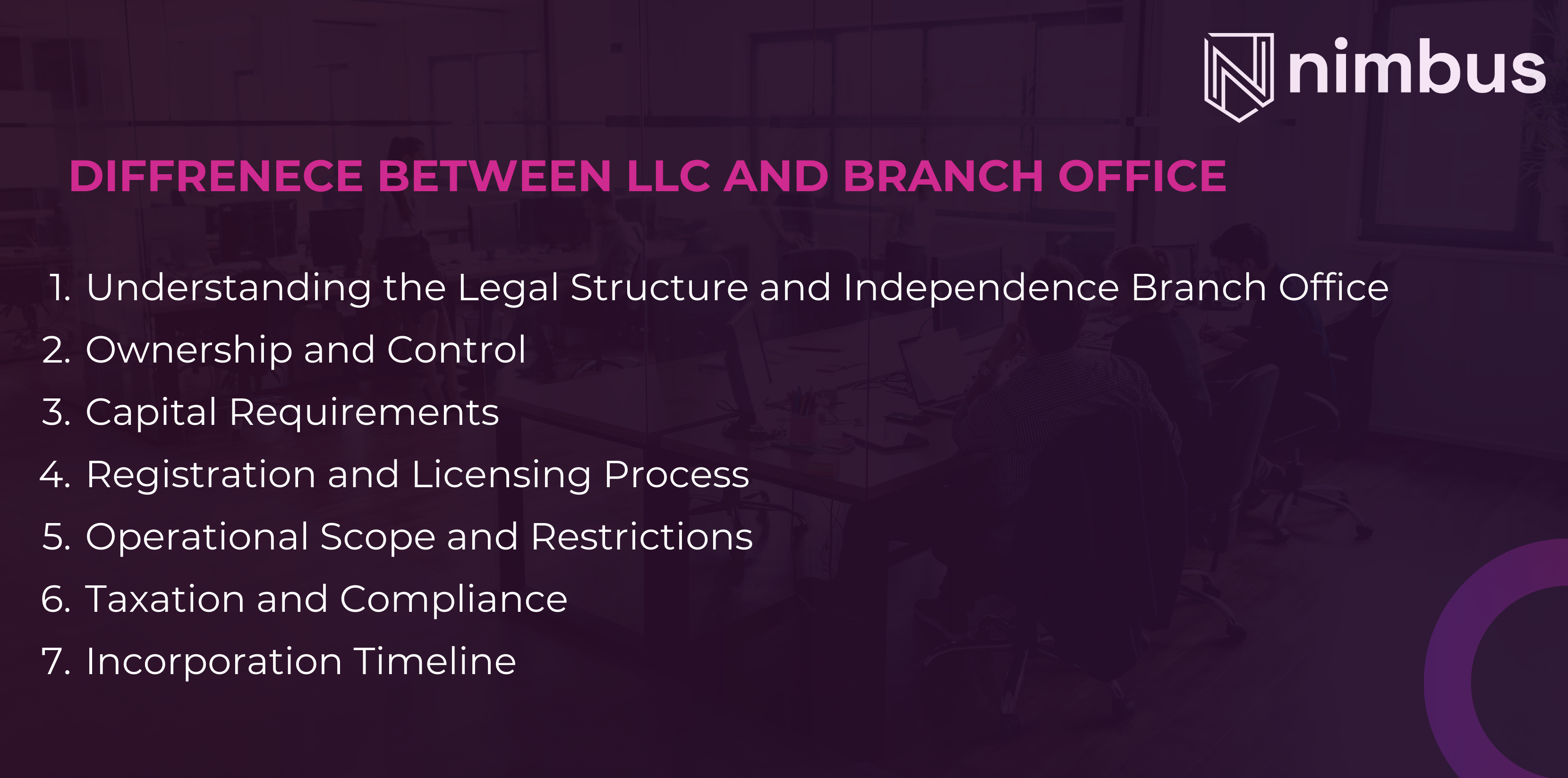Expanding into Saudi Arabia presents a wealth of opportunities for foreign businesses, but selecting the right business structure is a crucial first step. The choice between establishing a subsidiary (LLC) or a branch office can impact everything from ownership flexibility to taxation and operational scope.
Understanding the key differences and similarities between these two entity types will help businesses align their setup with their strategic goals. This guide breaks down the critical aspects of subsidiaries and branch offices to assist foreign companies in making an informed decision.
DIFFRENECE BETWEEN LLC. & BRANCH OFFICE IN SAUDI ARABIA (KSA)

1. Understanding the Legal Structure and Independence
Branch Office
- A branch office is an extension of a foreign parent company and is not a separate legal entity.
- It operates under the parent company’s name and must engage in the same business activities.
- The parent company remains fully liable for the branch’s financial and legal obligations.
- Any major decision made by the branch requires notarized and authenticated approval from the parent company.
Subsidiary (LLC)
- A subsidiary is a legally independent entity, typically structured as a Limited Liability Company (LLC).
- While owned by the parent company, it operates independently, managing its financial and legal affairs separately.
- The parent company’s liability is limited to its investment in the subsidiary, reducing financial risk.
2. Ownership and Control
Branch Office
- The parent company can maintain 100% foreign ownership, though restrictions apply in certain sectors.
- It is commonly used for businesses in contracting, consulting, and professional services rather than commercial trading or manufacturing.
Subsidiary (LLC)
- A subsidiary can be wholly owned by the foreign parent company or set up as a joint venture with local partners.
- This structure provides greater flexibility in engaging in various commercial activities, including trading and manufacturing.
3. Capital Requirements
Branch Office
- There is no minimum capital requirement, but the company may need to provide financial guarantees depending on its business activities.
Subsidiary (LLC)
- Minimum capital requirements vary based on the industry and ownership structure.
- A wholly foreign-owned LLC usually requires a higher capital investment than an LLC with a Saudi partner.
4. Registration and Licensing Process
Branch Office
- Must obtain a license from the Ministry of Investment of Saudi Arabia (MISA).
- The parent company’s documents must be attested and translated into Arabic before submission.
- Requires registration with the Ministry of Commerce (MoC).
Subsidiary (LLC)
- Involves MISA approval, drafting Articles of Association, and registration with MoC.
- Receives a Commercial Registration certificate upon incorporation.
- Must register with the Zakat, Tax, and Customs Authority (ZATCA) for tax and compliance purposes.
5. Operational Scope and Restrictions
Branch Office
- Limited to specific activities as per the MISA license.
- Generally restricted from engaging in commercial trading and manufacturing unless explicitly permitted.
Subsidiary (LLC)
- Enjoys broader operational flexibility, allowing for trading, manufacturing, and service-based activities.
- Can engage in a wider range of business activities than a branch office.
6. Taxation and Compliance
Branch Office
- Subject to corporate tax on non-Saudi shareholders’ profits.
- The parent company is responsible for compliance and financial reporting.
- Companies headquartered in countries with double tax treaties with Saudi Arabia may qualify for reduced tax rates and exemptions on withholding tax.
Subsidiary (LLC)
- Subject to corporate income tax and Zakat regulations.
- Must maintain its own financial records and file independent tax returns.
- May be eligible for government tax breaks and incentives depending on the sector.
7. Incorporation Timeline
Branch Office
- Typically takes 2 to 3 months to complete the registration and licensing process.
Subsidiary (LLC)
- Incorporation takes 2 to 4 months, as it involves additional approvals and documentation, including the drafting of Articles of Association.
– How to Decide Between a Subsidiary or a Branch Office?
Choosing between a subsidiary (LLC) and a branch office depends on several factors, including business objectives, operational needs, and risk tolerance.
When to Choose a Branch Office
- If the business aims to maintain 100% foreign ownership without forming a separate legal entity.
- If operations are limited to specific professional services like consulting or contracting.
- If the parent company is comfortable being fully liable for the branch’s financial and legal responsibilities.
- If the company wants to avoid minimum capital requirements and minimize setup costs.
When to Choose a Subsidiary (LLC)
- If the business seeks greater operational independence from the parent company.
- If the company plans to expand into trading, manufacturing, or broader commercial activities.
- If the parent company wants to limit financial liability to its investment in the subsidiary.
- If the business intends to benefit from tax incentives and government support.
However, for making the right decision, it is also important for businesses to stay up to date with evolving Saudi laws and sector-specific regulations. Consulting with Saudi legal experts can help businesses navigate the setup process smoothly.
Company Formation in Saudi Arabia
Saudi Arabia presents vast opportunities for foreign businesses, but choosing the right business structure is key to long-term success. Foreign businesses should carefully evaluate their goals, regulatory requirements, and financial considerations before deciding on the best entity type.
With proper planning and expert guidance, companies can successfully establish themselves in Saudi Arabia’s dynamic and fast-growing economy.



